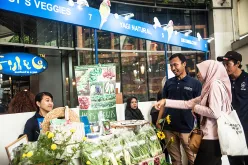Dyah Arum Selebesia is a national UN Volunteer Biodiversity Finance and Implementation Officer serving with the UN Development Programme (UNDP) in Indonesia. She shares her insights on increasing community involvement in Indonesia’s biological diversity conservation.
Dyah joined the Biodiversity Finance Initiative (BIOFIN) Project as a UN Youth Volunteer in 2018. BIOFIN is a global partnership that addresses the challenges of biodiversity financing in a comprehensive way. This initiative provides an innovative methodology that enables countries to measure biodiversity expenditure in the medium term and identify financial solutions that are most suitable for bridging biodiversity and financial disparities.
Biodiversity is a valuable asset and should be treated as one by us citizens for our future. It is a shared responsibility, from the government to individual level. As a UN Volunteer in the Environment Unit, my role is to persuade everyone to protect, maintain and conserve existing biodiversity. --Dyah Arum Selebesia, national UN Volunteer Biodiversity Finance and Implementation Officer with UNDP, Indonesia
Dyah took part in the first event of BIOFIN, Bio-Economy Expo, which was held in March 2019 to commemorate World Wildlife Day. It was conducted to bridge the collaboration between researchers, business groups and start-ups, as well as increase awareness on the new economic opportunity in this sector. The Expo is well placed to increase investment in Indonesian biodiversity, and has four pillars: the Business Expo, Demo Day, Bio Talks and Bio Hackathon.
In her view, the community so far has received little attention from the biodiversity utilization sector, especially millennials. Most of them consider biodiversity important for nature or tourism. They may not realize that this is also an opportunity to promote youth-driven businesses that focus on innovative solutions for environmental conservation and biodiversity protection. Dyah also believes that there is potential to attract start-ups from various sectors and improve the entrepreneurial skills of young people.
I am inspired by E.O. Wilson, who wrote: "Look closely at nature. Every species is a masterpiece, exquisitely adapted to the environment in which it has survived. Who are we to destroy or even diminish biodiversity?" --Dyah Arum Selebesia
In 2020, Dyah also participated in an event for International Biodiversity Day, organized in collaboration with the Ministry of Environment and Forestry and UNDP Indonesia on the Challenges and Opportunities for Post-Biodiversity Funding. This webinar discussed the main drivers and key obstacles post-2020 biodiversity funding and measures and policies to overcome them, mainly through Innovative financial solutions, including ecological fiscal transfer, debt for nature swaps, carbon credit financing, corporate social responsibility and State Sharia Securities.
This event was a turning point for Dyah, who realized that it is important to continue developing innovative finance solutions, since one cannot solely rely on funding from the central government. She believes that the country needs an innovative financing system which can attract the private sector. There is also a need to focus on how biodiversity financing shifts from traditional financing to more innovative financing.
Through her involvement in biodiversity-related projects, Dyah realized that it was not enough to discuss the issue of biodiversity funding. Key issues such as deforestation, hunting and trade in protected plants and animals need to be explored and discussed as well.

This article was prepared with the kind support of Online Volunteer Kathakali Das Bhaumik.

